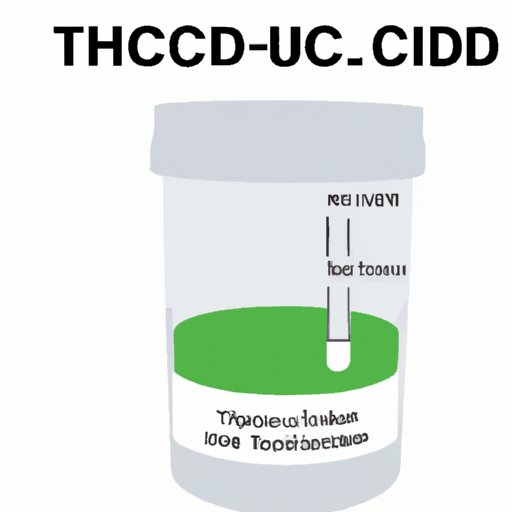Introduction
Marijuana is a popular drug across the world and it is becoming increasingly accepted for medicinal and recreational use. However, despite its growing popularity, marijuana is still illegal in most countries, and employers are often concerned about employees using the drug while on the job. This has led to widespread testing for the drug, particularly in the form of urine testing. In this article, we will explore how long THC and CBD, the two most commonly detected compounds in marijuana, stay in urine. We will discuss how they are metabolized, factors that affect detection times, and finally, the accuracy of urinalysis tests.
How Long Does THC and CBD Stay in Your Urine? A Comprehensive Guide
Before we dive into the details of how long THC and CBD stay in urine, it’s important to understand the detection window, which is the period during which metabolites of the compounds can be detected using urinalysis tests.
The detection window varies depending on many factors, such as the frequency of marijuana use, the amount of marijuana consumed, the method of consumption, and the individual’s metabolism rate.
According to research, THC can be detected in urine between 3-30 days after use, while CBD is not frequently tested for as it is not psychoactive, and has a much shorter detection window of only a few days.
The difference in detection windows is attributed to the way the two compounds are processed in the body.
Factors That Affect Detection Times
As previously stated, there are several factors that affect detection times for THC and CBD in urine, such as:
- Frequency of marijuana use
- Amount of marijuana consumed
- Method of consumption
- Individual metabolism rate
The more frequently marijuana is consumed, the longer it takes to eliminate THC from the body, and therefore the longer it can be detected in urine. The same applies to the amount of marijuana consumed.
The method of consumption also affects detection times; smoking marijuana generally leads to higher THC levels, meaning it will take longer to be eliminated from the body than if it was consumed in an edible form.
Estimated Timeframe for Different Types of Marijuana Use
Here’s an estimated timeframe for how long THC can be detected in urine, based on different types of marijuana use:
- Single-use: 3-4 days
- Moderate use (3-4 times per week): 5-7 days
- Heavy use (daily): 10-30 days
- Chronic use (multiple times per day): 30+ days
It’s important to remember that these are just estimates and times can vary based on the previously mentioned factors.
The Difference Between THC and CBD in Terms of Detection Times
As previously mentioned, CBD has a much shorter detection window than THC due to how it’s processed in the body. Because CBD is not psychoactive, it’s not typically tested for, and a positive result for CBD would likely be due to the presence of THC in the product.

The Science of Marijuana Metabolism: Understanding the Lifespan of THC and CBD in Your Urine
Marijuana contains over 100 different cannabinoids, but THC and CBD are the most commonly tested for. When marijuana is consumed, the compounds are metabolized and processed differently in the body.
Explanation of How Marijuana is Metabolized in the Body
Marijuana, including THC and CBD, is absorbed through the lungs when smoked, or through the digestive system when consumed orally. Once the compounds enter the bloodstream, they are carried to the liver where they are processed and broken down into metabolites.
The primary metabolite of THC is THC-COOH, while CBD is metabolized into at least 30 different metabolites. These metabolites are what are typically tested for in urinalysis tests.
How THC and CBD Are Processed and Eliminated
Once processed and broken down in the liver, the metabolites are then excreted from the body via urine, feces, and sweat. The THC-COOH metabolite, in particular, is excreted slowly, which is the reason THC can be detected in urine for several days or even weeks after use.
While CBD is processed and eliminated much faster than THC, it’s important to note that the two compounds can interact and affect the metabolism of one another. For example, the presence of CBD in marijuana can reduce the rate at which THC is metabolized, leading to higher THC levels and longer detection times in urine.
Differences in Metabolites and How They Can Be Detected
As previously mentioned, THC is metabolized into THC-COOH, which is the primary metabolite that urinalysis tests detect. Detecting THC itself is difficult because it is quickly metabolized and eliminated from the body.
CBD, on the other hand, is metabolized into multiple metabolites, but not all of them can be detected using urinalysis tests. This is why CBD is not generally tested for in urinalysis tests.
Facts and Myths About Marijuana: Debunking the Claims on THC and CBD’s Detection Window in Urine
As with any controversial topic, there are many misconceptions and outright myths surrounding marijuana use and its detection in urine. Here are a few commonly held beliefs that are untrue:
- Myth: Drinking lots of water will help you pass a urine test.
- Truth: Drinking lots of water will only dilute the urine, meaning that THC levels will be lower, but the test will be flagged for dilution instead. It’s recommended to follow other methods to speed up the metabolism of THC, such as exercise and having a healthy diet.
- Myth: THC can stay in your system for up to 90 days.
- Truth: While there have been reports of THC being detected in urine up to 90 days after use, this is very rare. Typically, THC can be detected up to 30 days after use.
- Myth: You can’t fail a urine test for CBD.
- Truth: While CBD is not typically tested for, it’s been reported that some urinalysis tests can detect trace amounts of THC, leading to a false positive result for CBD. It’s important to know what type of test is being used and whether or not it tests for CBD.
Everything You Need to Know About THC and CBD: From Absorption to Excretion in Your Urine
Overview of the Process of THC and CBD Absorption
When marijuana is consumed, it enters the bloodstream and is carried to the liver where it is broken down into metabolites. The compounds are then transported to other parts of the body, including the brain, where they interact with cannabinoid receptors and produce the desired effects.
Factors Affecting THC and CBD Excretion
Several factors can affect how quickly THC and CBD are eliminated from the body, including:
- Metabolism rate
- Age
- Body fat percentage
- Hydration level
People with faster metabolisms tend to eliminate THC and CBD faster than others. Additionally, younger people tend to eliminate the compounds faster than older adults, while those with higher body fat percentages tend to retain THC and CBD for longer periods of time.
Importance of Hydration and Exercise in Speeding Up the Elimination Process
Staying hydrated and getting regular exercise can help speed up the elimination process for THC and CBD.
Drinking plenty of water helps to flush out the urinary system and increase urine production, helping to eliminate cannabis metabolites faster. Exercise can also be helpful, as it speeds up the metabolism and can help to burn body fat, where THC and CBD can be stored for longer periods of time.

Up in Smoke: The Truth About THC and CBD Detection via Urinalysis
Explanation of the Process of Urinalysis
Urinalysis is a common method used to test for the presence of THC and other drugs in a person’s system. The process involves collecting a urine sample and testing it for the presence of certain metabolites, such as THC-COOH or other compounds.
Overview of the Types of Tests Used to Detect THC and CBD
There are two primary types of urinalysis tests used to detect cannabis metabolites: immunoassay tests and gas chromatography/mass spectrometry (GC/MS) tests. Immunoassay tests use antibodies to detect THC and its metabolites in urine, while GC/MS tests use more sensitive equipment to identify the exact compounds in the urine sample.
How Accurate Are the Tests?
While urinalysis tests are generally considered accurate, there are some discrepancies that can occur. For example, false positives can occur if the person being tested has consumed hemp-based products or other legal substances that can trigger a positive result. Additionally, some tests may be more or less sensitive than others, leading to different results depending on the type of test used.
Conclusion
Understanding how long THC and CBD stay in urine is important for anyone who uses marijuana, whether medicinally or recreationally. Factors such as frequency of use, method of consumption, and individual metabolism rate can all affect detection times, and there are many myths and misconceptions surrounding the process of urinalysis testing. By staying informed and following healthy habits such as hydration and exercise, people can help speed up the elimination process and produce negative results on tests.
Ultimately, it’s important to remember that marijuana use is still illegal in many places, and employers and law enforcement officials will continue to test for it. By staying informed and responsible, individuals can minimize the risks associated with marijuana use and enjoy the benefits of the drug safely and legally.
